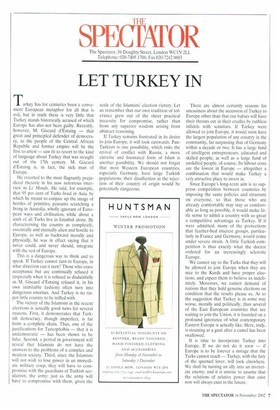LET TURKEY IN
Turkey has for centuries been a convenient European metaphor for all that is evil, but in truth there is very little that Turkey stands historically accused of which Europe has also not been guilty. Recently, however, M. Giscard d'Estaing — that great and principled defender of democracy, as the people of the Central African Republic and former empire will be the first to attest — saw fit to resort to the kind of language about Turkey that was straight out of the 17th century. M. Giscard d'Estaing is, in fact, the sick man of Europe.
He resorted to the most flagrantly prejudiced rhetoric in his now notorious interview in Le Monde. He said, for example. that 95 per cent of Turks lived in Asia, by which he meant to conjure up the image of hordes of primitive peasants scratching a living in Anatolia, wholly ignorant of European ways and civilisation, while about a sixth of all Turks live in Istanbul alone. By characterising the country as completely, essentially and eternally alien and hostile to Europe, as well as backward morally and physically, he was in effect saying that it never could, and never should, integrate with the rest of Europe.
This is a dangerous way to think and to speak. If Turkey cannot turn to Europe, in what direction can it turn? Those who crave acceptance but are continually refused it (especially when it is refused as disdainfully as M. Giscard d'Estaing refused it, in his own inimitable fashion) often turn into dangerous enemies. And Turkey is no tinpot little country to be trifled with.
The victory of the Islamists in the recent elections is actually good news for several reasons. First, it demonstrates that Turkish democracy, though imperfect, is far from a complete sham. Thus, one of the justifications for Turcophobia — that it is undemocratic — has been shown to be false. Second, a period in government will reveal that Islamists do not have the answers to the problems of a complex and modern society. Third, since the Islamists will not wish to lose power in an immediate military coup, they will have to compromise with the guardians of Turkish secularism, the army: just as the army will have to compromise with them, given the scale of the Islamists' election victory. Let us remember that our own tradition of tolerance grew out of the sheer practical necessity for compromise, rather than from any superior wisdom arising from abstract reasoning.
If Turkey remains frustrated in its desire to join Europe, it will look eastwards. PanTurkism is one possibility, which risks the revival of conflict with Russia; a more extreme and frustrated form of Islam is another possibility. We should not forget that most Western European countries, especially Germany, have large Turkish populations; their disaffection at the rejection of their country of origin would be potentially dangerous. There are almost certainly reasons for uneasiness about the accession of Turkey to Europe other than that our babies will have their throats cut in their cradles by ruthless infidels with scimitars. If Turkey were allowed to join Europe, it would soon have the largest population of any country in the community, far surpassing that of Germany within a decade or two. It has a large fund of intelligent entrepreneurs, educated and skilled people; as well as a large fund of unskilled people, of course. Its labour costs are the lowest in Europe — altogether a combination that would make Turkey a very attractive place to invest in.
Since Europe's long-term aim is to suppress competition between countries by imposing the same policies and structure on everyone, so that those who are already comfortable may stay as comfortable as long as possible, it would make little sense to admit a country with so great a competitive advantage as Turkey. If it were admitted, many of the protections that feather-bed interest groups, particularly in France and Germany, would come under severe strain. A little Turkish competition is thus exactly what the doctor ordered for an increasingly sclerotic Europe.
We cannot say to the Turks that they will be allowed to join Europe when they are nice to the Kurds and have proper elections, and expect them to believe us indefinitely. Moreover, we cannot demand of nations that they hold genuine elections on condition that the results please us. As to the suggestion that Turkey is in some way worse, morally and politically, than several of the East European countries that are waiting to join the Union, it is founded on a profound ignorance of what contemporary Eastern Europe is actually like. Here, truly, is straining at a gnat after a camel has been swallowed.
It is time to incorporate Turkey into Europe. If we do not do it soon — if Europe is to be forever a mirage that the Turks cannot reach — Turkey, with the fury of the spurned lover, will look elsewhere. We shall be turning an ally into an inveterate enemy; and it is unwise to assume that the relations of relative power that exist now will always exist in the future.


























































































 Previous page
Previous page